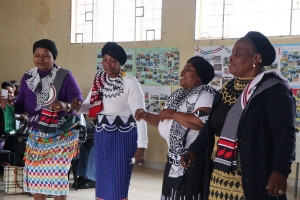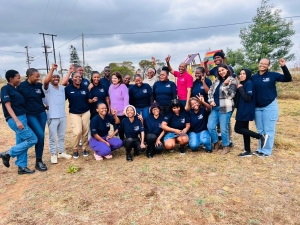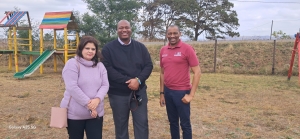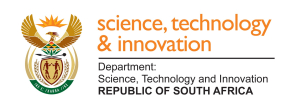Refurbishment and Reconstruction Of The Safe Park
28 August 2024
The scourge of poverty stricken, under-resourced and marginalised communities in the South African landscape have left rural villages and spaces without resources and social support for healthy families and child well-being. The deep impact of the HIV|AIDS and more recently, the COVID-19 pandemic that have given birth to many child-and granny headed households, have entrenched vulnerabilities of children who are orphaned or abandoned. Moreover the lack of resources in such contexts, leave very few safe spaces where children can engage in developmental activities, play, or benefit from positive peer support. Consequently, these children are at risk for substance use, pregnancy, school drop- out and other social ills. Similarly those left to care for these children, be it elder siblings or elderly grandparents are without any form of help and support in these spaces. They grapple with having to serve as parents to those who are their siblings or grandchildren and face a multitude of struggles both financial and psychological to ensure the best care for these children. Moreover, the village spaces themselves are bereft of resources and in themselves through these various social ills unsafe areas for children.
Through a science shop grant, the Durban University of Technology (DUT) is collaborating with communities in Ndwedwe in KwaZulu Natal to address the myriad of societal challenges that are negatively affecting households and the well-being of children in the villages. Thus, a community based participatory approach to creating a safer physical and psychological space for children and these diverse families to thrive in is crucial. In this regard, the rural women and men themselves can act as a huge resource, when capacitated through the expertise of the university. Both the intellectual resources of the university and the wisdom and strengths of elders and community leaders can lead to these deep rural villages being reconstructed into safer spaces. Students and academics can train rural men and women to better support child and granny headed households. Of significance is the fact that these rural spaces can be reconstructed into field placements sites not only for student training but that final or fourth year students can share their expertise in training rural men and women to support the child and granny headed households. The project is led by experienced and NRF-rated researcher, Professor Raisuyah Bhagwan and supported by three final and masters (Ms Inamandla Gumede, Ms Noorain Khan and Ms Nokwanda Mthethwa) students, collaborating with community-field researchers in Ndwedwe. The project focuses on three areas: grandmother-headed households, child and youth care, and African Spirituality.
Whilst the necessity of the project is to provide child and youth care services to vulnerable rural children in the context of their families and communities in South Africa, there still remains much work to be done to capacitate those rural men and women to strengthen service delivery. This can be achieved by fourth year students who have been taught a broad array of child and family care interventions. Moreover, the problems identified by the community partner, which includes teenage pregnancies, substance abuse, school dropout and child neglect needs to be addressed, together with strengthening the capacities of the child headed and granny headed households. Holistically these constitute the different threads of issues confronting children and families. This study will seek not only to find solutions to how the care and well-being of children and their families can be strengthened; how the caregivers roles and support can be strengthened and how the rural villages can be reconstructed into more safer spaces for children, youth and their caregivers. This will require a reconstruction of both the physical and psychological make-up of the village spaces in tandem with community representatives.
On 12 August 2024, DUT launched a refurbished Safe Park in Ndwedwe as part the project aspirations for reconstructing physical spaces in the villages to make them safer and healthier for children and families. In her welcoming, Prof Bhagwan provided context for the refurbishing of the safe park, highlighting the need for the spaces where children can engage in activities that enhance development and receive peer support, which ultimately, minimise chances for attracting negative behaviours and lifestyles e.g. substance abuse.
Echoing community voices and sentiments, Mr Themba Majola thanked DUT for supporting vulnerable households and children through its science shop project. Of more benefit to the communities has been the home visits, which enables the research team to understand the complexities of the families, and therefore, offer better care and support for children, youth and grandmothers. The three masters students thereafter shared the activities they have conducted in the last year.
- Granny Headed Households by Ms Gumede: Various activities linked to grandmothers heading households in Ndwedwe, which involved knitting, parenting skills training, self-care activities, fun day events, and home visits were implemented and are ongoing. Concerning the actual research project, individual interviews with 9 participants (grandmothers raising grandchildren) have been conducted, and a focus group discussion was held with 11 participants.
- African Spirituality by Ms Mthethwa: With specific reference to the data collection, 12 in-depth interviews and a focus group discussion have been completed with traditional leaders and community members practicing African spirituality. Data collection was also co-facilitated with a community partner. Data analysis has begun and is being done jointly with community partners. Through African Spirituality, therapeutic support groups are conducted with community members from child and granny-headed households including storytelling, poetry writing, and reflections. This also includes beadwork projects and a talent show showcasing traditional talents such as song, which are ongoing activities.
- Child and Youth Care by Ms Khan: DUT have held capacity-building workshops with fourth year child and youth care students, who were selected for their placement in Ndwedwe. The workshops aimed to equip these students with the necessary skills and knowledge to effectively engage with children, youth, families, and the community. Additionally, topics on community development and community-based participatory research were covered to further facilitate their roles. This initiative highlights the importance of continuous training and support for individuals working in the field of child and family care. More importantly, it prepared these students to plan and work collaboratively around the activities linked to the grandmother headed households and the Safe Park and issues impacting the safety and well-being of the children and families in the community. The 15 fourth or final-year students were introduced to the community, management, and child and youth care workers on 15 April 2024. The students have been addressed and informed about the community of Ndwedwe and the challenges that families face in these rural areas.
In closing, Dr Moeti Kgware, Head of Department: Community Health Studies at DUT thanked the community for the partnership and creating a conducive for the DUT to conduct research. He further thanked DSI and NRF for the grant funding support. The refurbishment and reconstruction project was led by the final year child and youth care students who collaborated with the community members on designing, painting, and decorating the community hall and play structures in the Park.





 The South Africa Agency for Science and Technology Advancement (SAASTA) is a business unit of the
The South Africa Agency for Science and Technology Advancement (SAASTA) is a business unit of the 
